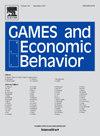从有偏见的民意调查中得出推论
IF 1
3区 经济学
Q3 ECONOMICS
引用次数: 0
摘要
人们在回答无激励的 "民意测验 "时,往往试图通过夸大美德行为来展示自己的正面形象。我们研究了其他人在从这种无激励的回答中得出推论时,是否会考虑到这种 "社会期望的回答"(SDR)。在一项实验中,我们激励 "预测者 "猜测他人在不同社会可取性行动中的选择行为。预测者观察随机子样本(i)受激励的选择或(ii)假设性主张。假设性主张表现出系统性的社会可取性,预测者对其持合理怀疑态度。然而,他们的怀疑态度并不是根据特别提款权的方向或大小而调整的。即使受试者对行为的陈述情绪可以预测 SDR,这种修正不足的情况还是会发生。本文章由计算机程序翻译,如有差异,请以英文原文为准。
Inference from biased polls
People often attempt to present a positive image by overstating virtuous behaviors when responding to unincentivized “polls.” We examine whether others account for this “socially desirable responding” (SDR) when drawing inferences from such unincentivized responses. In an experiment, we incentivize “predictors” to guess others' choice behaviors across actions with varying social desirability. Predictors observe random subsamples of either (i) incentivized choices or (ii) hypothetical claims. The hypothetical claims exhibit systematic SDR and predictors are reasonably skeptical of them. However, their skepticism is not tailored to the direction or magnitude of SDR. This under-correction occurs even though subjects' stated sentiment toward the actions can predict SDR.
求助全文
通过发布文献求助,成功后即可免费获取论文全文。
去求助
来源期刊

Games and Economic Behavior
ECONOMICS-
CiteScore
1.90
自引率
9.10%
发文量
148
期刊介绍:
Games and Economic Behavior facilitates cross-fertilization between theories and applications of game theoretic reasoning. It consistently attracts the best quality and most creative papers in interdisciplinary studies within the social, biological, and mathematical sciences. Most readers recognize it as the leading journal in game theory. Research Areas Include: • Game theory • Economics • Political science • Biology • Computer science • Mathematics • Psychology
 求助内容:
求助内容: 应助结果提醒方式:
应助结果提醒方式:


